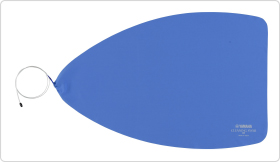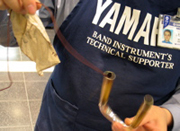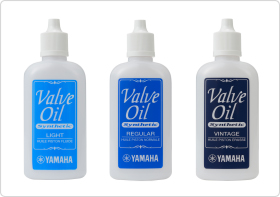Care and Maintenance of a Tuba
Tools to Help with Maintenance
Do not worry about tarnish on the surface
Silver fog or discoloration (particularly darkening from oxidation) is a sign of hard film forming on the tuba's surface and actually helps protect the interior of the instrument. Since it can affect the tone, there are some professional tubaists who intentionally refrain from cleaning their instrument until it tarnishes.
Normally, silver polish is not used for maintenance, but if the discoloration truly bothers you, it is acceptable to use a dab of polish on a cloth.
Use a swab to remove any moisture
Brass instrument "maintenance" is really comparatively simple-it is sufficient to polish the outside surface with a special cloth and some chemical polish. The inside poses challenges. Brass instruments are sensitive to moisture. If saliva and other kinds of moisture adhere to the inside of the tuba, it can corrode and rust. Wiping away moisture is the first line of defense.
A swab, which is a weighted cloth with a string, is handy for removing the moisture from inside the tubes. The swab has been a longstanding part of saxophone and woodwind instrument maintenance, while recently also becoming available in versions for the trumpet, trombone, horn, euphonium, tuba, and other brass instruments. It is your steadfast ally during maintenance.
Use a swab particularly for the sections from the mouthpiece to the slides, which tend to collect moisture. You can also use it on the slides as well. First, remove the slide, then run the weight into the joint where the mouthpiece is inserted and feed it out through the bottom. This will take care of the moisture in the main tube. Next, run the swab through the slide you removed. The curvature of the slides makes them prone to collecting moisture, so be sure to run the swab through them.
Just one to two minutes of cleaning can effectively take care of the moisture and greatly improve the life of your instrument.

There are different swabs for different brass instruments

Don't forget to run the swab through the slide
Use valve oil after you finish playing!
Standard practice includes oiling your piston valves before and after playing. Many people remember to apply oil before playing but are tempted to quickly return the tuba to its case when finished. To protect your pistons, however, it is also important to apply oil after you play.
Valve oil serves as lubricant and protectant. Applying oil before you play ensures smooth, lubricated valves. After playing, there is a fair amount of moisture in the valves from your saliva. This is the archenemy of the valves and leads to rust and corrosion. So, it is important to oil the pistons after you play the tuba. Valve oil is effective enough to protect your pistons from rust on contact, which prolongs the life of pistons. It takes less than a minute, so please adopt the habit of oiling your valves before returning the tuba to its case.

Different types of valve oil The Vintage variety (on the right) is for low-toned instruments like the euphonium and tuba.
Musical Instrument Guide:Tuba Contents
Origins
Structure
How to Play
How the Instrument is Made
Choosing an Instrument
Trivia
- A Massive Tuba from 100 Years Ago
- Depending on the Country, a Baritone is Not a Baritone
- The Cinbasso-Popular in Italian Opera
- All Brass Instruments Have Marching Band Models
- Famous Musical Pieces for the Tuba (Bass)
- The Compensating System for the Euphonium
- There are Various Mutes for the Tuba
- Ease of Playing Pedal Tones
- Why Are Tubas So Expensive?
- Do Jazz Musicians Play the Tuba?
- Brass Band Songs Featuring the Tuba
- An Instrument in the Key of B♭, Yet the Music is Written in C
